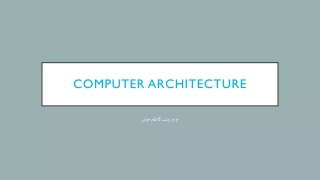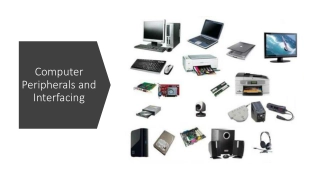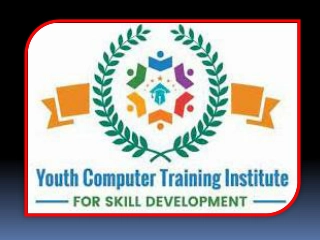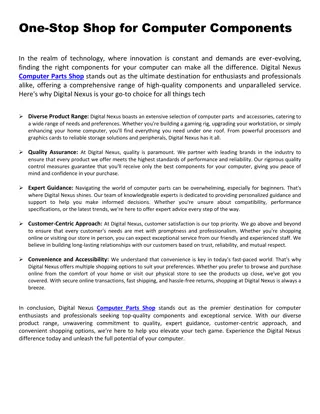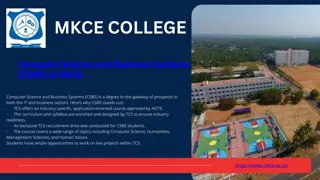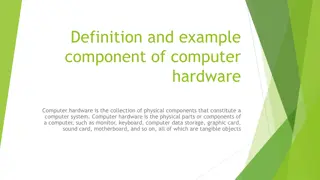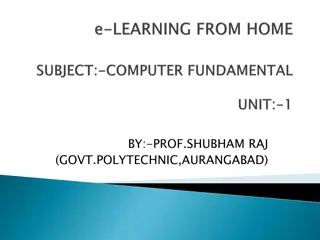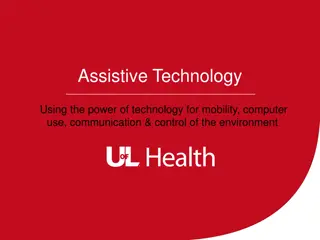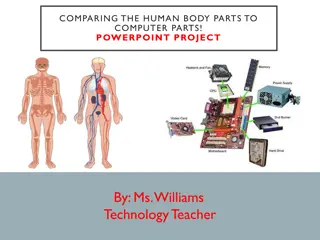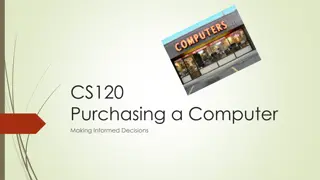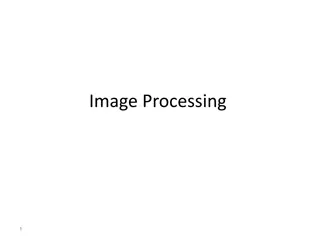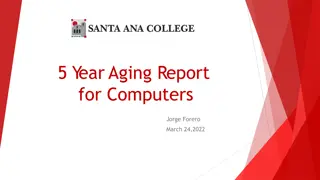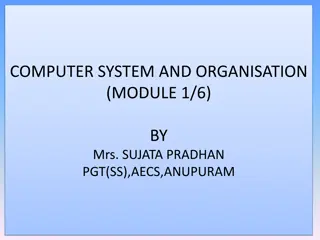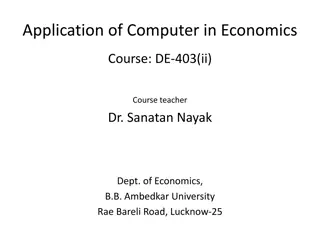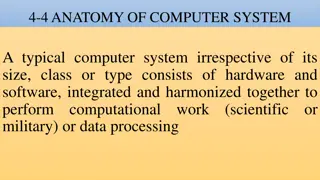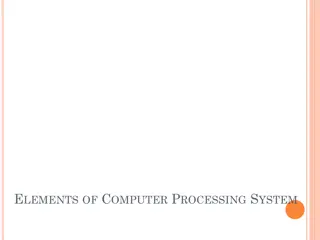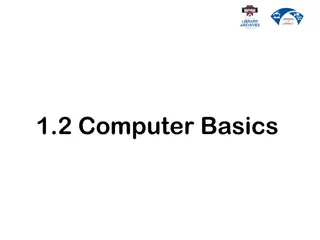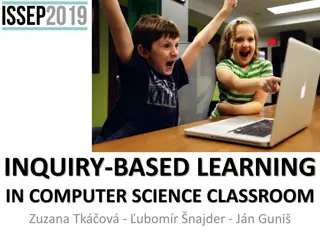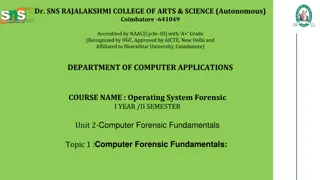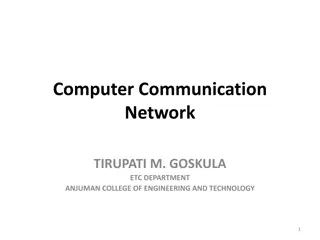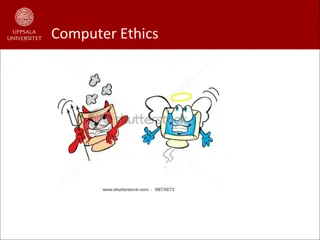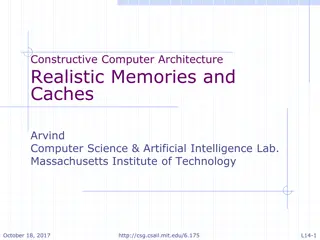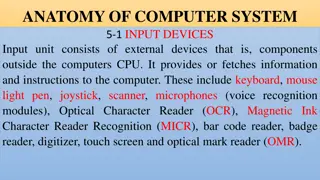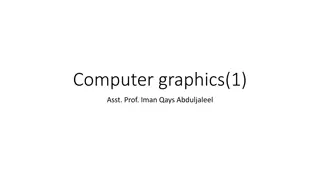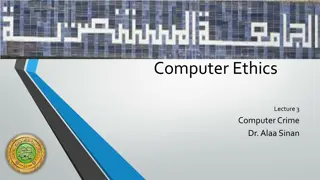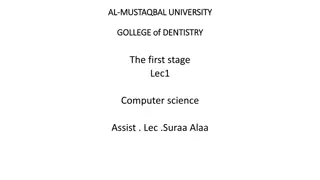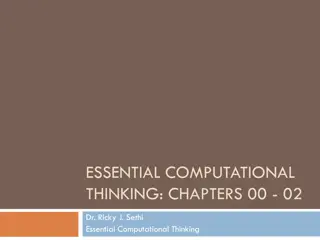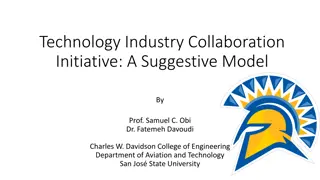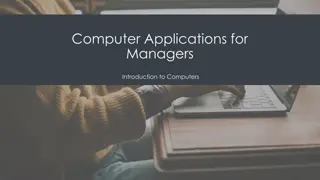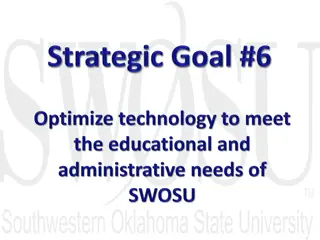Rescue Drone: Increasing Autonomy and Implementing Computer Vision
Focuses on developing a rescue drone with increased autonomy and implementing computer vision for advanced object detection. The team, consisting of Cody Campbell (Hardware Engineer), Alexandra Borgesen (Computer Engineer), Halil Yonter (Team Leader), Shawn Cho (Software Engineer), Peter Burchell (M
78 views • 44 slides
Computer Components and Microprocessor: Understanding Computer Architecture
Explore the main computer components and learn about the operation of these components, including inputting, storing, processing, outputting, and controlling. Understand the role of the microprocessor in computer processing and its characteristics such as instruction set, bandwidth, and clock speed.
11 views • 20 slides
Role of Computer Science in Modern Society
Computer science plays a crucial role in various sectors of life, from business to education. It encompasses a wide range of disciplines, including software development, hardware engineering, system designing, networking, and database administration. The field's scope extends beyond traditional comp
1 views • 20 slides
Computer Peripherals and Interfacing
Computer peripherals are external devices that enhance the functionality of a computer. They include input devices like keyboards and mice, output devices like printers and monitors, and storage devices like hard disk drives and solid-state drives. Interfacing circuits connect these peripherals to t
1 views • 6 slides
Youth Computer Training Centre in Belghoria, West Bengal
Belghoria Youth Computer Centre, organized by the Institute of Instrumentation and Metrology (IIM), is a private industrial training institute located in Belghoria, West Bengal. It offers various computer courses to meet the increasing demand for trained technical professionals in the state, particu
1 views • 38 slides
Understanding Computer Organization and Architecture
A computer system is a programmable digital electronics device that processes data as per program instructions to provide meaningful output. It comprises hardware and software components, with hardware being the physical parts and software essential for driving the hardware. Computer organization fo
14 views • 71 slides
Explore the World of Computer Graphics in CSE452
Dive into the fascinating realm of computer graphics with CSE452. Learn about modeling, rendering, animation, and its various applications in entertainment, design, education, and more. Discover the techniques of computer-aided design, 3D scanning, procedural modeling, and rendering for photorealist
12 views • 24 slides
Introduction to Components of a Computer System in Home Science
Explore the components of a computer system in Home Science, including input devices like the keyboard, alphanumeric keypads, cursor movement keys, and special keys such as Enter, Ctrl, Esc, and more. Learn about the internal structure of a computer system and the key functions of CPU, ALU, memory,
8 views • 12 slides
One-Stop Shop for Computer Components
Buy retailer price and all latest desktop component prices in Bangladesh at computer village buy your desire computer parts price in Bangladesh see all computer accessories price casing, ram, graphic card, hard disk, SSD, cooling fan, etc\n
10 views • 1 slides
Computer Science and Business Systems (CSBS) at MKCE
Computer Science and Business Systems (CSBS) at MKCE\nWelcome to the world of Computer Science and Business Systems (CSBS) at M.Kumarasamy College of Engineering (MKCE), an avant-garde and industry-specific program designed to forge the future leaders of technology and business. Moreover, if you\u20
0 views • 2 slides
Overview of Computer Hardware Components and Software Functions
Computer hardware components such as monitor, CPU, mouse, and projector are essential physical parts of a computer system, while software includes intangible programs like operating systems and utility software. Hardware components perform tasks like displaying data, processing information, and prin
8 views • 9 slides
Understanding the Basics of Computer and Its Components
A computer is an electronic device that processes data input by the user to provide output results. It comprises components like ALU, CU, and MU, each with specific functions. The CPU acts as the brain of the computer, transforming raw data into information. The system's memory units, RAM and ROM, s
2 views • 12 slides
Enhancing Lives with Assistive Technology
Assistive Technology empowers individuals with disabilities by providing tools and solutions for mobility, communication, and daily tasks. This technology, defined as items or systems that improve functional capabilities, helps redefine disability, increase resilience, and enable individuals to enga
1 views • 27 slides
Comparing Human Body Parts to Computer Parts - Technology Project Presentation
Explore the fascinating analogy between human body parts and computer components in this technology project by Ms. Williams. Students match specific body parts to computer parts, highlighting functions and similarities, fostering a deeper understanding of both systems. An engaging way to learn about
2 views • 18 slides
Essential Guide to Computer Purchasing Decisions
Learn about different computer types, hardware options, necessary features, and internal components to make informed decisions when purchasing a computer. Explore the differences between desktops, laptops, tablets, smartphones, and more, along with a breakdown of input and output options, processing
2 views • 11 slides
Understanding Computer Vision and Image Processing
Introduction to the fields of computer vision and image processing, exploring their differences and how they intertwine. Computer vision focuses on processing images for computer use, while image processing enhances images for human consumption. Topics include image analysis, restoration, enhancemen
1 views • 100 slides
Comprehensive Report on Computer Aging and Replacement Plan
This detailed report provides insights into the aging of computers categorized by fiscal years, use type, and cost. It includes statistics on instructional and non-instructional desktops and laptops, accompanied by corresponding cost breakdowns. Additionally, the report outlines the funding mileston
1 views • 8 slides
Understanding Computer Architecture and Organization
Computer architecture and organization are fundamental aspects of computing systems. Computer architecture focuses on the functional design and implementation of various computer parts, while computer organization deals with how operational attributes come together to realize the architectural speci
3 views • 40 slides
Understanding Computer System and Organization
Computer Organization involves the logical structure of a computer, defining the interconnections of components for optimal performance. Computers process data through an Input-Process-Output cycle, with input, processing, and output units working together. The characteristics of a computer include
1 views • 20 slides
Application of Computer in Economics Course: DE-403(ii) with Dr. Sanatan Nayak
Computer application in economics is essential for data management and analysis. The course covers definitions, features, basic computer organization, and evolution. It explores the characteristics of computers such as high speed, accuracy, diligence, versatility, and memory power. The evolution of
2 views • 194 slides
Computer Science Department Information and Courses Offered
The Computer Science Department provides information on courses offered for GCSE or BTEC qualifications, specifically focusing on the AQA GCSE in Computer Science. The course equips students with valuable thinking and programming skills essential in the modern workplace, covering key concepts and pr
3 views • 7 slides
Anatomy of a Computer System: Hardware Components and Functions
A typical computer system consists of hardware and software working together to perform various computational tasks. The hardware components include the central processing unit (CPU), input/output devices, storage units, and the motherboard. The CPU acts as the main brain of the computer, performing
6 views • 6 slides
Understanding Computer Processing Systems
Computer processing systems consist of various components such as the control unit, ALU, input unit, CPU, output unit, memory, and more. Input devices feed raw data to the computer, while output devices provide processed information. The CPU plays a crucial role in executing instructions and data pr
0 views • 13 slides
Understanding Computer Basics for Beginners
Explore the fundamental concepts of computer technology, from the importance of computers to the distinction between hardware and software. Discover how computers function, the role of operating systems, and the significance of learning computer skills. Uncover the essential components of a computer
1 views • 36 slides
**Exploring Inquiry-Based Learning in Computer Science Education**
Inquiry-based learning (IBL) in computer science classrooms focuses on fostering communication, collaboration, decision-making, and problem-solving skills among students. The approach involves students constructing knowledge through independent, active activities based on real-world experiences. How
0 views • 18 slides
Computer Forensic Fundamentals in Modern Computing Environment
The field of computer forensics has become increasingly significant due to rising cybercrimes. Dr. SNS Rajalakshmi College of Arts & Science offers insights into computer forensic services, including data collection, analysis, and investigations. Digital evidence plays a crucial role in both legal p
0 views • 27 slides
Evolution of Algorithms and Computer Science Through History
The history of algorithms and algorithmic thinking dates back to ancient times, with the development of general-purpose computational machines by Charles Babbage in the 19th century marking a significant advancement. The term "computer science" emerged in 1959, encompassing theoretical computer scie
1 views • 39 slides
Understanding Computer Communication Networks at Anjuman College
This course focuses on computer communication networks at Anjuman College of Engineering and Technology in Tirupati, covering topics such as basic concepts, network layers, IP addressing, hardware aspects, LAN standards, security, and administration. Students will learn about theoretical and practic
0 views • 72 slides
Exploring Computer Ethics and Privacy Principles
Computer ethics and privacy principles are essential in the evolving technology landscape. This content delves into different perspectives on computer ethics, views on privacy protection, and the implications of human enhancements. It highlights the importance of respecting proprietary rights, shari
0 views • 9 slides
Constructive Computer Architecture Realistic Memories and Caches
Explore the realm of constructive computer architecture, realistic memories, and cache systems as presented by the Computer Science & Artificial Intelligence Lab at Massachusetts Institute of Technology. Delve into topics like 2-stage pipeline, magic memory models, and memory system views to gain in
0 views • 20 slides
Overview of Computer Input and Output Devices
Input devices of a computer system consist of external components like keyboard, mouse, light pen, joystick, scanner, microphone, and more, that provide information and instructions to the computer. On the other hand, output devices transfer information from the computer's CPU to the user through de
0 views • 11 slides
Understanding Computer Graphics: An Overview
Computer graphics involves creating images and animations using a computer through hardware and software systems. It has evolved significantly over the years, with advancements in generating various types of computer graphics. Learn about the basics of computer graphics, including digital image repr
0 views • 15 slides
Understanding Computer Crimes and Prevention Strategies
Computer crimes involve illegal acts utilizing computer systems, leading to various consequences. This lecture covers the types of computer system attacks, motives behind computer crimes, costs, prevention strategies, and reflection on the discussed topics. It emphasizes the increasing scope of comp
1 views • 20 slides
Introduction to Computer Science: Programming, Algorithms, and Technology Overview
Delve into the fascinating world of computer science with a comprehensive exploration of programming, algorithms, and technology. From foundational concepts like CPU architecture and logic units to practical languages such as Java and Python, this content covers a wide array of topics essential for
0 views • 6 slides
Overview of Computer Science at Al Mustaqbal University College of Dentistry
Al Mustaqbal University College of Dentistry offers courses in computer science, covering topics like data reception, processing, storage, and output. The curriculum includes the study of computers as electronic devices, data and information, computer features, operating systems like Windows, and ta
0 views • 10 slides
Understanding the Essence of Computer Science and Computational Thinking
Delve into the fundamentals of Computer Science and Computational Thinking through chapters discussing the nature of science, predictions in physics, and the distinction between Computer Science and Computer Information Systems. Explore the relationships between Math, Physics, and Computer Science i
0 views • 29 slides
Technology Industry Collaboration Initiative: A Suggestive Model for San Jose State University
This initiative led by Prof. Samuel C. Obi and Dr. Fatemeh Davoudi aims to explore opportunities in Silicon Valley manufacturing and computer/electronics industries to support San Jose State University's Industrial Technology programs. The study focuses on maintaining collaborative relationships wit
0 views • 6 slides
Understanding Computer Applications for Managers
This educational material introduces computer applications specifically tailored for managers, covering basic functions, operating systems, program navigation, file management, and more. It delves into essential computer concepts, hardware components, software systems, security measures, efficiency
0 views • 39 slides
The Impact of Globalisation on Cybercrime and Computer-aided Crime
Globalisation has brought about significant social changes that have led to the emergence of new forms of crime, facilitated by advancements in computer technology. Cybercrime and computer-aided crime have become prevalent in contemporary societies, with activities ranging from identity theft and el
0 views • 8 slides
SWOSU Technology Optimization Plan
This plan outlines strategic initiatives aimed at optimizing technology to meet the educational and administrative needs of SWOSU. Key focus areas include upgrading identified computers, enhancing technology staffing and support, improving data mining and learning analytics, ensuring satisfaction wi
0 views • 15 slides

